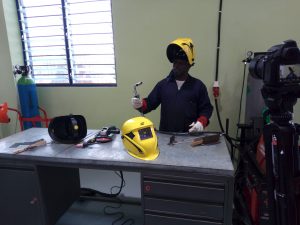A total of 1,000 Ghanaians will receive training annually as part of the newly launched Accelerated Oil and Gas Capacity Programme (AOGC), President Nana Akufo-Addo, has said.
Two hundred Small and Medium Scale Enterprises (SMEs) will also be provided with the capacity to gain a competitive advantage in the industry while some three hundred employees in public institutions will be prepared adequately to support the development of oil and gas policies and enforcement of industry regulations.
In a speech read on his behalf by the Minister of Energy, President Akufo-Addo, speaking at the launch of the AOGC, said that several opportunities exist in the oil and gas sector especially in the area of local participation for the benefit of all Ghanaians. He however lamented that the main problem in the sector is the lack of requisite technical skills and expertise to meet the often high standards set out by the oil companies.
“Our universities continue to train geologists and petroleum engineers. However, we have not been able to train the technicians and middle-level personnel who are in high demand by the oil industry”, the President said.
He explained that, one of the surest ways of ensuring active Ghanaian participation in the oil and gas industry is to build the capacity of Ghanaians to take up the many opportunities available in the industry.
“The AOGC programme will thus guarantee that local service providers and personnel are given requisite skills and technical know-how, from entrepreneurship to engineering, to strengthen their effective participation in the oil and gas sector, as well as in other allied industries,” he said.
“The initiative signifies government’s commitment to ensuring that Ghanaians and Ghanaian companies find themselves at the forefront of our oil and gas industry. We are determined to expand opportunities in the industry, and to use it as a catalyst for the rapid transformation of our country”, he added.
Speaking at the launch, Acting Chief Executive of the Petroleum Commission, Egbert Faibille Jnr. said that four years after the passage of the Local Content Regulations for the Petroleum sector, human resource capacity constraints has still been identified as a major challenge in the industry. He said regardless of the current 62% local participation in the sector, a lot more needed to be done to ensure that local participation in key areas of technical expertise in the oil and gas upstream sector is achieved.
“What is pleasing is that Ghanaians are increasingly occupying senior management and core technical positions in the industry. We however concede that a lot more can be done and ought to be done. It is in this regard that the Commission considers the President’s Initiative of the the Accelerated Oil and Gas Capacity Programme timely and apt,” he said.
The Accelerated Oil and Gas Capacity Programme (AOGC) will cover four thematic areas including:
- Technical, Vocational, Apprenticeship Development and Utilisation
- Capacity Development of educational institutions
- Capacity Building for Small & Medium Enterprises (SMEs)
- Capacity Building for Public Institutions
A total of seven educational institutions under a World Bank Facility will also benefit from the program to train first class welders and technicians to serve the needs of the oil industry.
The Minter of Energy, Boakye Agyarko commissioned a welding, mechanical and fabrication workshop facility at the Regional Maritime University, constructed as part of the AOGC programme objectives to facilitate the development of practical vocational and technical skills needed in the industry.
By Kennedy Aryeetey Tetteh l thebftonline.com l Ghana










